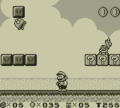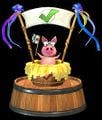Checkpoint: Difference between revisions
No edit summary |
mNo edit summary |
||
| Line 1: | Line 1: | ||
'''Checkpoints''' are objects within a [[level]] which mark the point where the player can continue from after losing a [[extra life|life]]. | '''Checkpoints''' are objects within a [[level]] which mark the point where the player can continue from after losing a [[extra life|life]]. | ||
In ''[[Super Mario Bros.]]'', ''[[Super Mario Bros.: The Lost Levels]]'', ''[[Super Mario Land]]'', and ''[[Super Mario Galaxy]]'', checkpoints are unmarked, with the player simply resuming from a place in the level they had passed; while in ''[[Super Mario Bros. 2]]'', every [[Warp Door]] serves as a checkpoint, as do the [[Mini Rocket|rocket]]s from [[World 4-2 (Super Mario Bros. 2)|Worlds 4-2]] and [[World 7-1 (Super Mario Bros. 2)|7-1]]; ''[[Super Mario Bros. 3]]'' has no checkpoints due to having shorter levels, while ''[[Super Mario 64]]'' and ''[[Super Mario Sunshine]]'' typically lack them due to most levels having a sandbox structure; however, | In ''[[Super Mario Bros.]]'', ''[[Super Mario Bros.: The Lost Levels]]'', ''[[Super Mario Land]]'', and ''[[Super Mario Galaxy]]'', checkpoints are unmarked, with the player simply resuming from a place in the level they had passed; while in ''[[Super Mario Bros. 2]]'', every [[Warp Door]] serves as a checkpoint, as do the [[Mini Rocket|rocket]]s from [[World 4-2 (Super Mario Bros. 2)|Worlds 4-2]] and [[World 7-1 (Super Mario Bros. 2)|7-1]]; ''[[Super Mario Bros. 3]]'' has no checkpoints due to having shorter levels, while ''[[Super Mario 64]]'' and ''[[Super Mario Sunshine]]'' typically lack them due to most levels having a sandbox structure; however, warping to a few exceptional areas in the former, the player will return directly to that point upon re-entering the level, such as in the Volcano of [[Lethal Lava Land]], and similarly for "secret" areas in the latter, an unmarked checkpoint is used instead of returning the player to [[Delfino Plaza]], as would normally happen upon death. | ||
The first ''[[Super Mario (series)|Super Mario]]'' game to feature an object that acted solely as a checkpoint is ''[[Super Mario World]]'' with its [[Midway Gate]]. Subsequently, other variations were used, including the [[Bell (Super Mario Land 2: 6 Golden Coins)|Bell]] of ''[[Super Mario Land 2: 6 Golden Coins]]'' and the [[Middle Ring]] of ''[[Super Mario World 2: Yoshi's Island]]''. Since the release of ''[[New Super Mario Bros.]]'' for the [[Nintendo DS]], however, ''Super Mario'' games have largely standardized on the usage of [[Checkpoint Flag]]s. | The first ''[[Super Mario (series)|Super Mario]]'' game to feature an object that acted solely as a checkpoint is ''[[Super Mario World]]'' with its [[Midway Gate]]. Subsequently, other variations were used, including the [[Bell (Super Mario Land 2: 6 Golden Coins)|Bell]] of ''[[Super Mario Land 2: 6 Golden Coins]]'' and the [[Middle Ring]] of ''[[Super Mario World 2: Yoshi's Island]]''. Since the release of ''[[New Super Mario Bros.]]'' for the [[Nintendo DS]], however, ''Super Mario'' games have largely standardized on the usage of [[Checkpoint Flag]]s. | ||
| Line 15: | Line 15: | ||
StarBarrel DKC.png|A [[Star Barrel]] from ''[[Donkey Kong Country 2: Diddy's Kong Quest]]'' | StarBarrel DKC.png|A [[Star Barrel]] from ''[[Donkey Kong Country 2: Diddy's Kong Quest]]'' | ||
ProfChops.jpg|Figurine of a [[Professor Chops]] checkpoint from ''[[Donkey Kong Country: Tropical Freeze]]'' | ProfChops.jpg|Figurine of a [[Professor Chops]] checkpoint from ''[[Donkey Kong Country: Tropical Freeze]]'' | ||
WLSML3-CheckpointAni.gif|Unactivated (left) and activated (right) [[Skull (Wario Land: Super Mario Land 3)|skull]]s from ''[[Wario Land: Super Mario Land 3]]'' | |||
Checkpoint Block.PNG|A [[Checkpoint Block]] from ''[[Wario Land: Shake It!]]'' | Checkpoint Block.PNG|A [[Checkpoint Block]] from ''[[Wario Land: Shake It!]]'' | ||
MiddleRing SMA3.png|A [[Middle Ring]] from ''[[Super Mario Advance 3: Yoshi's Island]]'' | MiddleRing SMA3.png|A [[Middle Ring]] from ''[[Super Mario Advance 3: Yoshi's Island]]'' | ||
Revision as of 21:50, March 17, 2018
Checkpoints are objects within a level which mark the point where the player can continue from after losing a life.
In Super Mario Bros., Super Mario Bros.: The Lost Levels, Super Mario Land, and Super Mario Galaxy, checkpoints are unmarked, with the player simply resuming from a place in the level they had passed; while in Super Mario Bros. 2, every Warp Door serves as a checkpoint, as do the rockets from Worlds 4-2 and 7-1; Super Mario Bros. 3 has no checkpoints due to having shorter levels, while Super Mario 64 and Super Mario Sunshine typically lack them due to most levels having a sandbox structure; however, warping to a few exceptional areas in the former, the player will return directly to that point upon re-entering the level, such as in the Volcano of Lethal Lava Land, and similarly for "secret" areas in the latter, an unmarked checkpoint is used instead of returning the player to Delfino Plaza, as would normally happen upon death.
The first Super Mario game to feature an object that acted solely as a checkpoint is Super Mario World with its Midway Gate. Subsequently, other variations were used, including the Bell of Super Mario Land 2: 6 Golden Coins and the Middle Ring of Super Mario World 2: Yoshi's Island. Since the release of New Super Mario Bros. for the Nintendo DS, however, Super Mario games have largely standardized on the usage of Checkpoint Flags.
Gallery
- SMB2 Doors.PNG
Unactivated (left) and activated (right) Midway Gates from Super Mario World
Unactivated Checkpoint Flag from New Super Mario Bros. Wii.
Activated Checkpoint Flag from Super Mario 3D Land
- Checkpoint DKL.PNG
Unactivated (top) and activated (lower) Continue Points from Donkey Kong Land
Figurine of a Professor Chops checkpoint from Donkey Kong Country: Tropical Freeze
Unactivated (left) and activated (right) skulls from Wario Land: Super Mario Land 3
- Checkpoint Block.PNG







